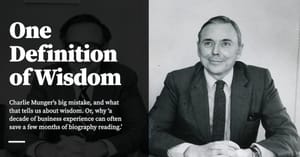As you might’ve already guessed, my approach to thinking about career planning is to read a lot.
We should probably pause a bit to consider if this is a valid strategy.
Let’s work backwards. The idea at the core of career strategy is that you have to make sense of the world before you can choose your moves. Most of us believe that the best thing we can do in our careers is to glom onto a growing industry, or to learn a set of skills that becomes valuable in the wake of a growing industry. The person who notices the coming change is better off than the person who doesn’t, and the person who prepares for the coming change is better off still.
The problem is that the world isn’t static, people are always too busy, and what is obvious isn’t what is valuable.
Reading deals directly with all three problems.
A static world is easy to analyse. A dynamic world needs context
The most dangerous problem I have when it comes to forecasting is that of presentism. I'd like to think that this is common to most of us. We think that whatever is happening to us now has never happened before, and that new technologies are leading us into an unprecedented future.
Don’t believe presentism is a problem? This isn’t very difficult to prove! See if any of the following arguments sound familiar to you:
- Bitcoin and other cryptocurrencies are completely new!
- Internet businesses are unlike anything that came before, its winner-takes-all effects and low marginal costs have led to unprecedented levels of monopoly!
- The rise of social media is robbing us of our common, shared sense of identity!
- The speed at which fake news is spreading is unprecedented and a threat to democracy!
- Our networked world is causing us to lose our privacy, unlike anything that has happened before!
Do you agree with these statements? Have you seen this arguments before? You should: these are views we see in the media nearly every day. You probably lap it up like I do.
If you’re anything like me, you’ll probably think that we can’t predict what’s going to happen next. You’re also likely to conclude that it’s better to not think anything at all, and to just wait it all out to see what happens next.
This is the right approach for some things, but it’s probably wrong for your career. Nearly everything that’s happening to us now — even if it’s something radically new (cough, blockchain, cough) has historical analogues. A person studying the history of the locomotive would see similar patterns with the development of the internet. You can then roll those observations back to think about the impact to your career.
To restate this, the value you get from reading history is the value of calibration: you place events happening today in their proper, historical context. I think this matters.
People are too busy to think
Let me pose to you the following list of questions, in reaction to the list of views I gave earlier:
- Bitcoin — The Bretton Woods system of monetary management created the gold standard. People designed this system at the end of World War 2. The fall of the Bretton Woods system in 1971 (otherwise known as the Nixon Shock) gave us the free floating system we have today. Wouldn’t reading a history of these systems tell us something about the cryptocurrency movement we have today?
- New monopolies — What happens when a new form of business emerges alongside a new industry? What happens when that business is able to win a monopoly? Wouldn’t reading the history of Standard Oil, or the East India Company give us an idea of what might happen next to Facebook and Google?
- The loss of our commons — Large scale immigration has often robbed nations of a common sense of shared identity. The history of the United States is particularly interesting: it’s had waves of immigration and a long history of ‘outsiders’, hated by its population, eventually integrating into the country (only to hate on the next wave of outsiders). What happened to its democracy in the meantime? What does it tell us about the current threats posed by social media in eroding our common sense of identity?
- Fake news — The muckraker age came swift, over a span of 30 years, and the rise of newspaper fortunes came equally quick with it. Journalism standards took some time to catch up. Wouldn’t this tell us something about our current obsession with fake news?
- Privacy — It is true that no threat to our privacy has ever come close to what we face today. But there are analogues. On the regressive end: what was it like to be spied upon by neighbour and friend alike, during the totalitarian regimes of the 1940s-1960s? And what happened when people realised they had rights as workers — something that had never occurred to them to have before? Wouldn’t that give us some idea about how societies organise in response to lost rights, rights they’d never considered as important in the past?
I hope I’ve made the case to you that the average knowledge worker doesn’t consider these questions through the lens of history. This is a competitive advantage that I think we can all earn: things that might not seem like big news to the average colleague may seem big to us if we can place them in the right context.
To put this another way: I’d like to believe that the world is knowable, and that seeing slightly further ahead than the competition is an edge that matters.
What is obvious isn’t what is valuable
And this leads me neatly into my last argument. History isn’t the only kind of reading that’s valuable. Working out the non-obvious implications of ideas presented in non-fiction books can also be hugely valuable.
I’ll give you an example to illustrate this point. My last major strategic career win was based on working through the implications of an essay by Patrick Mckenzie.
Patrick argues, almost in passing, that there is such a thing as a Profit Center and a Cost Center in a company, and that you want to be working for a Profit Center:
Peter Drucker — you haven’t heard of him, but he is a prophet among people who sign checks — came up with the terms Profit Center and Cost Center. Profit Centers are the part of an organization that bring in the bacon: partners at law firms, sales at enterprise software companies, “masters of the universe” on Wall Street, etc etc. Cost Centers are, well, everybody else. You really want to be attached to Profit Centers because it will bring you higher wages, more respect, and greater opportunities for everything of value to you. It isn’t hard: a bright high schooler, given a paragraph-long description of a business, can usually identify where the Profit Center is. If you want to work there, work for that. If you can’t, either a) work elsewhere or b) engineer your transfer after joining the company.
McKenzie goes on to argue that benefits accrue to those who work in a Profit Center, but not to those in a Cost Center. This is obvious. It’s also obvious that you can evaluate jobs using this framework. What isn’t so obvious is that it’s possible to use Profit Centers and Cost Centers as a tool to inform hiring strategy.
My previous company started out as a startup. Before we became profitable, we didn’t have much of a name, and I couldn’t find a good way to hire quality engineers in Vietnam. This was my job, and I was doing badly at it.
6 months in, I eventually realised that the majority of companies in Vietnam were outsourcing companies, the very definition of a cost centre. I reasoned that many of the problems described by McKenzie would resonate with potential hires. It also meant that even a small product company like ours could offer the benefits of a profit centre.
The execution was straightforward: we hired seniors out of bad outsourcing companies, and we honed our marketing to offer things only a profit centre could. This allowed us to compete for talent, even against the large outsourcing companies.
What is valuable isn't what is obvious. I think it’s worth working through the 2nd and 3rd-order implications of every new idea you read, just to see if you’re getting things other people don't get.
Or, to put that another way: what matters for your career is the ability to read books nobody else in your industry is reading, to think thoughts that the writers of the books your industry is reading hasn’t thought to write, and to work out what most people don’t have the patience to work out.
That's where you find your edge.
Originally published , last updated .





